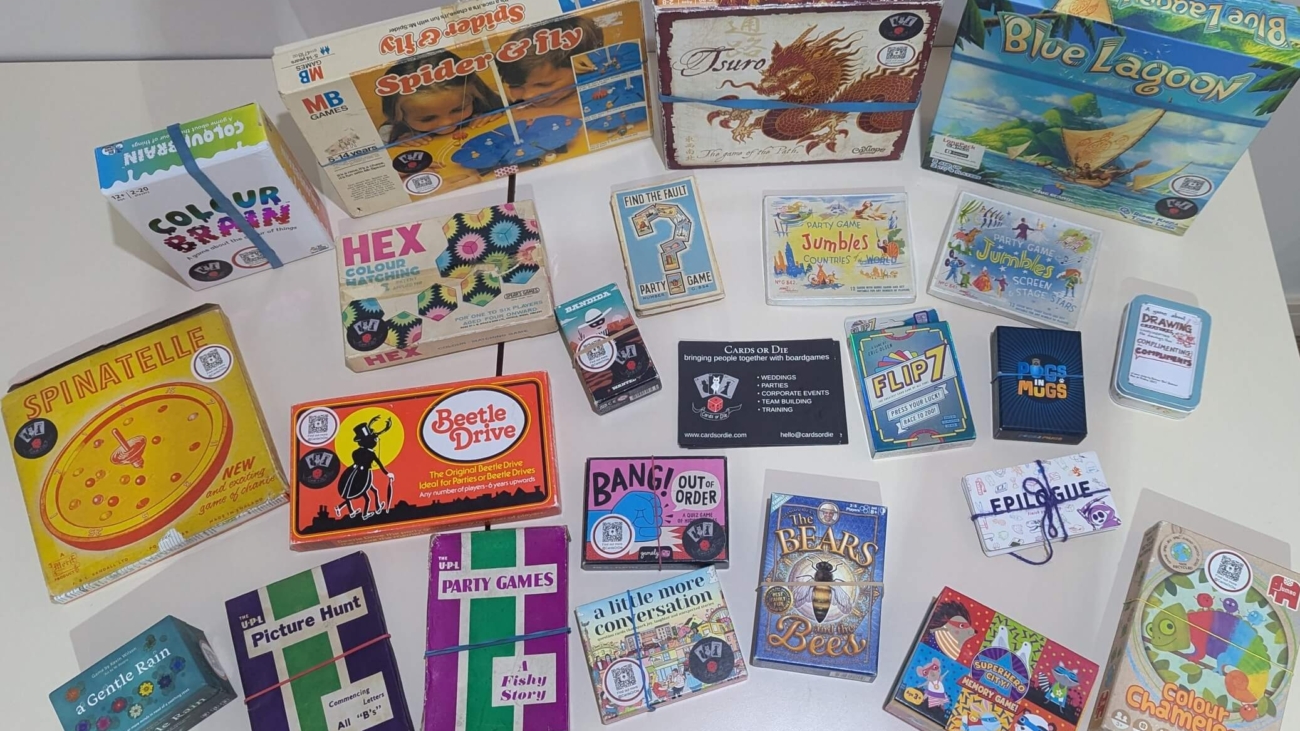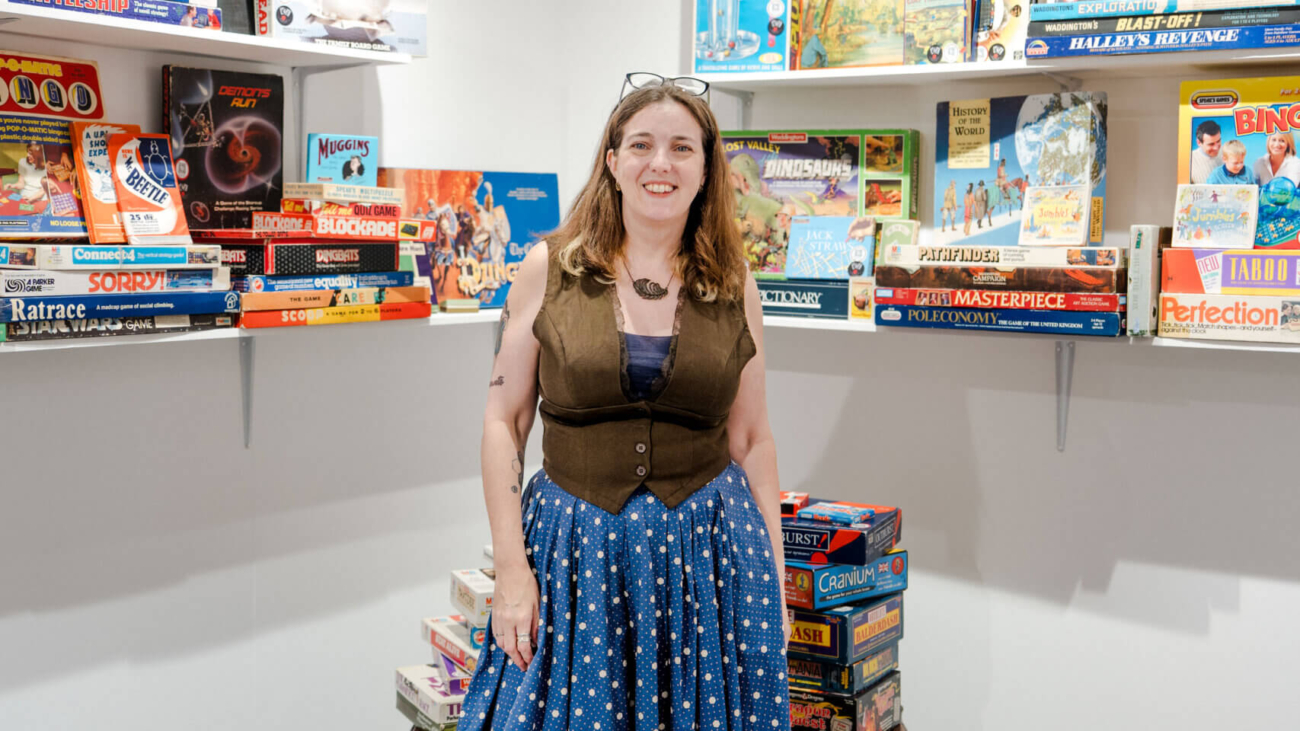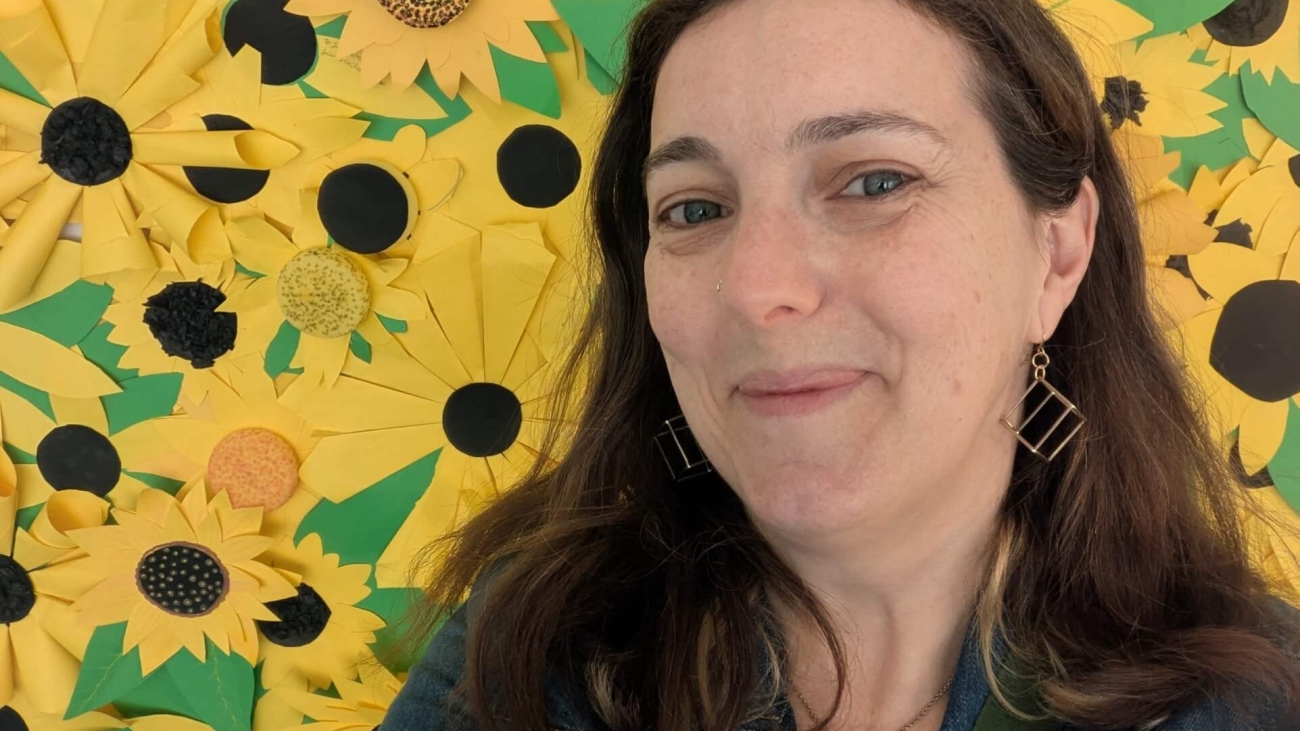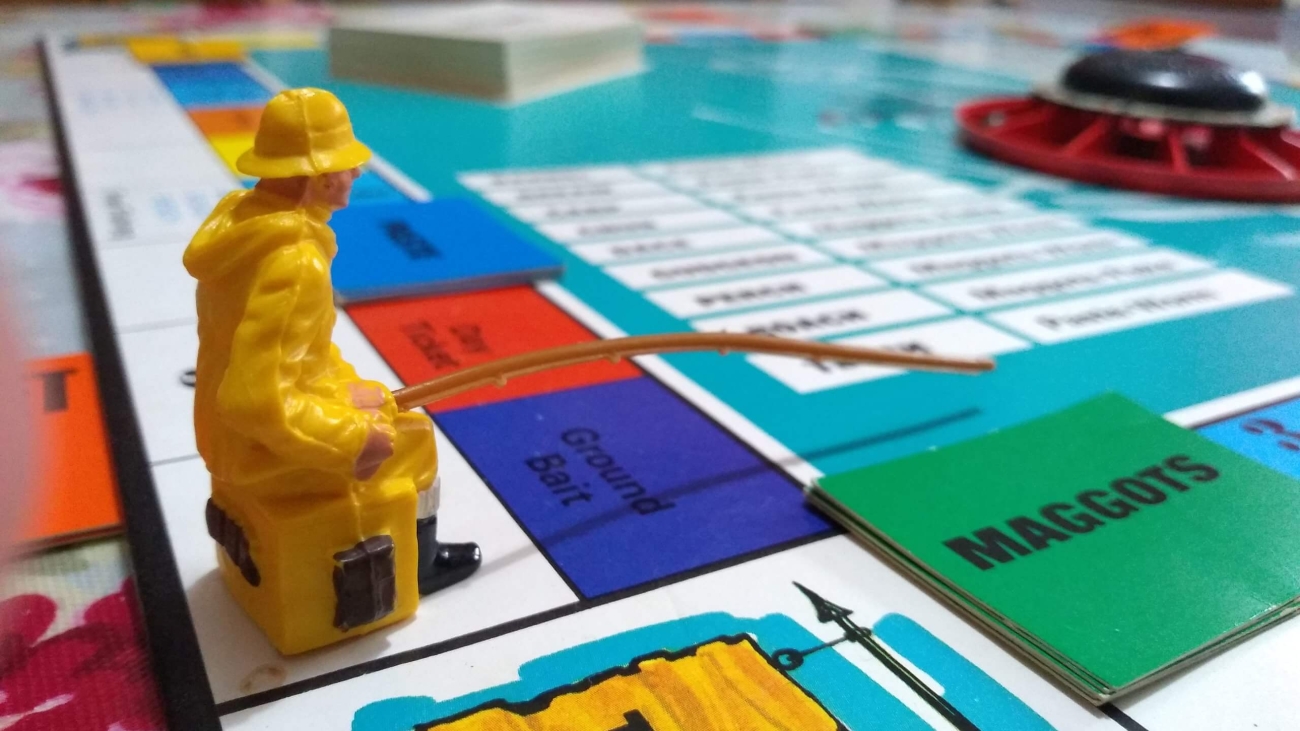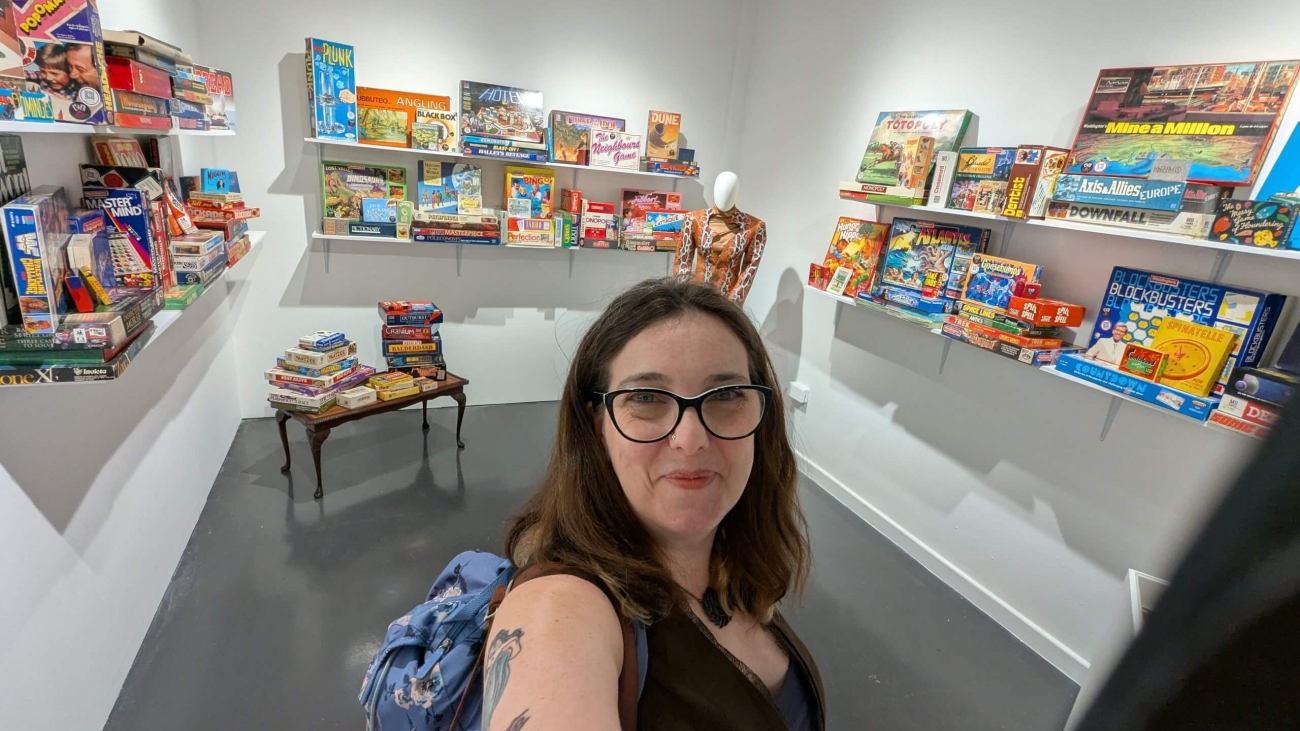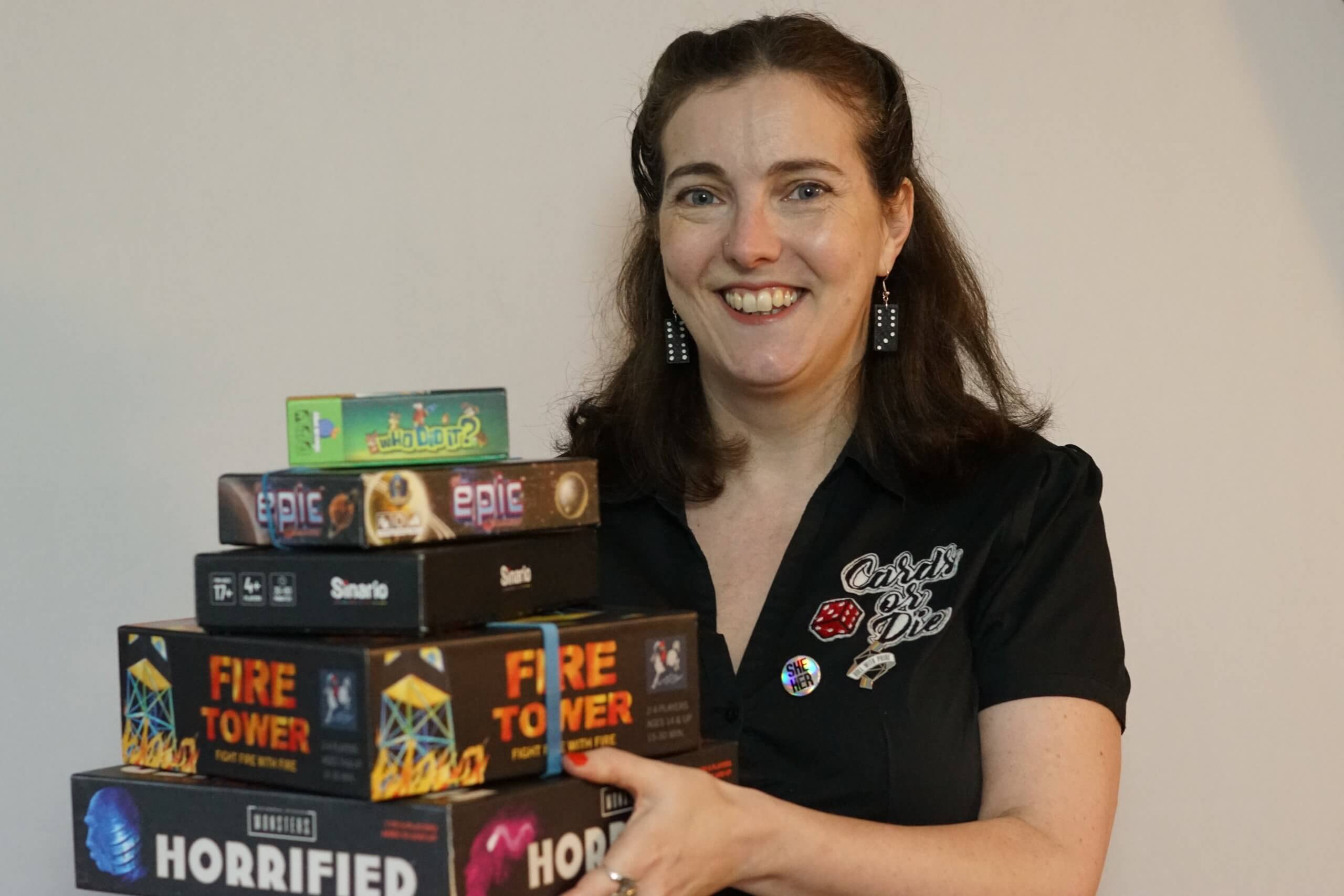If you’re looking for gifts that give fun, laughter and connection this Christmas, you need to be giving games! Most of these games will slot easily into a Christmas stocking…
Boardgames for new parents.
I went for games that would give your brain just a gentle stretch; that pair well with holding a baby whilst playing and probably not having had enough sleep.
Wanted – an itinerant bringer of joy*!
I’ve come across the advice to write my own job description a few times now. As a sole trader my role includes everything! – marketing, accounting, bookings, stock management, and everything else. I assume it’s a way of encouraging people to identify areas of weakness and celebrate areas of strength. I could use this as an opportunity to be reflective and identify on all the things I’d dearly love to delegate (mainly the accounts) but instead I thought I would entertain myself by imagining recruiting my replacement.
The Launch of Come as You Really Are
Nothing could have prepared me for this exhibition. Hetain Patel said that he wanted to put things together in a way that was ‘overwhelming, not in a negative way’ but in a celebratory, joyful way and he and Barnsley Civic have succeeded. Tiny, tiny things are nestled amongst huge imposing things, or there is a breathtaking abundance – like the sea of pom poms. He explained that there is no hierarchy in the exhibition – no this is ‘proper art’; no division between ‘this took a hundred hours to make while this took 10 minutes’ and no ‘this item is intrinsically more valuable’. All of it is equally impressive in different ways. In this way the emphasis falls on celebrating difference in all its glorious abundance.
As I rounded the corner and came face to face with my own board games. 155 of them. It took my breath away. To see these games that I love displayed instead of bursting from shelves in the study; to stay there and listen to people’s recollections, to watch their reactions and to chat to some of them about the games was joyful. I felt really connected to others. I didn’t feel the usual worry that I was ‘going on’ or not observing conversational cues or turn taking properly. I could breathe.
Patel also talked of ‘guilty pleasures’, things we might feel awkward about sharing about ourselves and he robustly challenged the very notion. We should be free to come as we really are. Our true, glorious selves.
The title suddenly resonated with me. I felt seen and in a positive way too. I have masked my Autism all my life. I have masked it from others and from myself. When people talk about unmasking, I don’t know how to. And underlying that is a pervasive fear that I don’t know who I am.
But at the launch evening – listening to Patel talk, all of that was washed away for 2 glorious days. It was such a privilege to be given that space and safety to unmask without even consciously doing so. I have pocketed some of that feeling and will try to keep it somewhere safe and close forever.

5 things I love about Airecon
1. Playing games with lovely folk
Airecon is a relatively small convention. I’ll happily go along on my own with incredibly vague arrangements to meet people. Admittedly it’s my local convention so I often see people that I know but I also usually manage to get a game in with people who I basically see annually. It’s such a joy for me to be able to connect with people over board games.
No Dice. No Magnets. Just Skill – Subbuteo Angling.
We finally got round to playing Subbuteo Angling.
It promises a ‘game of skill. No dice. No magnets.’ Plus an authentic experience of fly fishing.
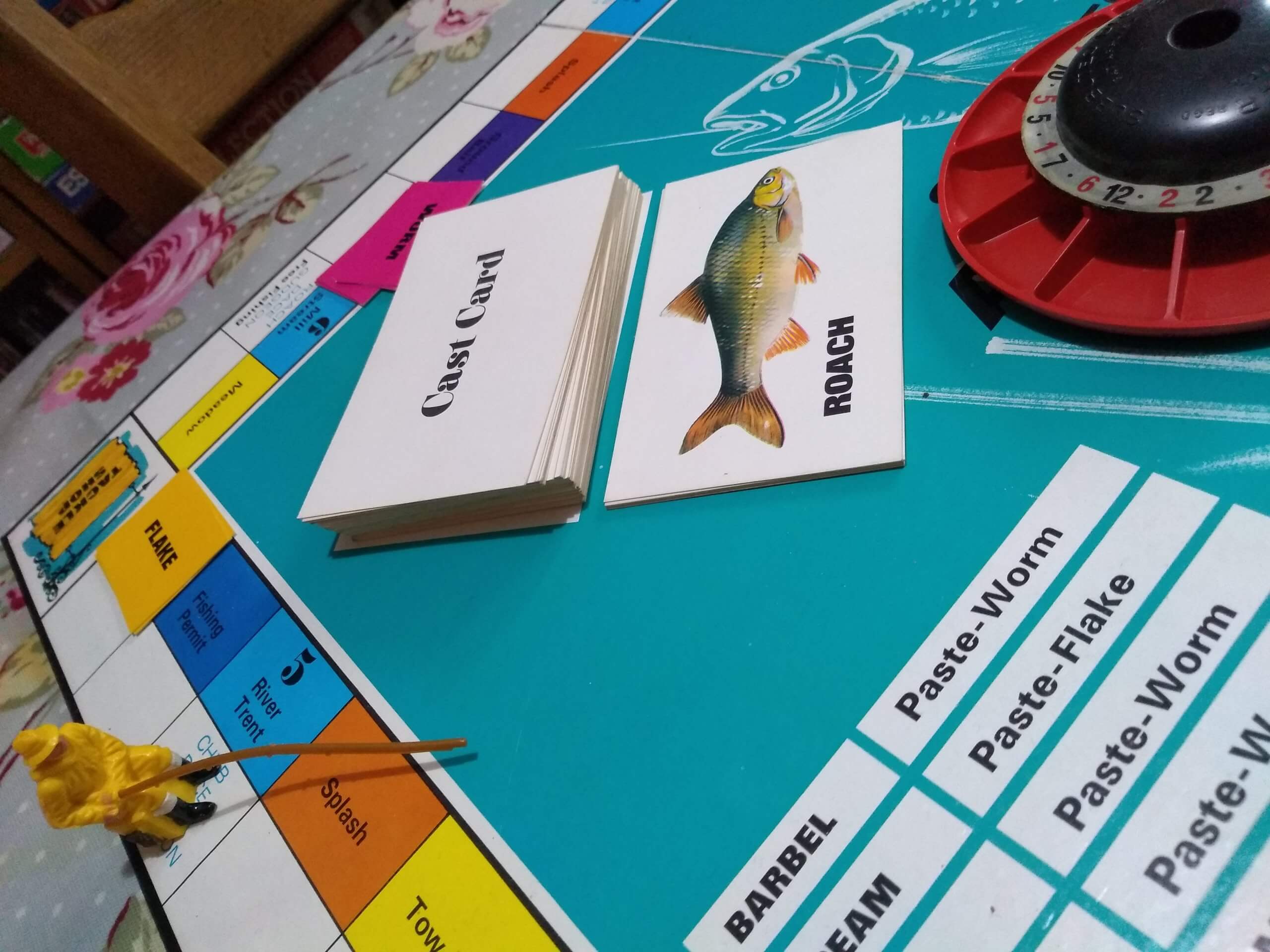
Although the game hasn’t been in the collection long, it’s actually from the 1970s.
The board is heavily monopoly influenced – your Cast and Splash cards replace Community Chest and Chance while passing through or landing on the Master Tackle Shop nets you some tackle or bait of your choice.
As you move around the board, you collect everything you need for your fishing expedition – permits, hook, line, bait, keep net, rod, reel and float. If you want to hang on to the heavier fish you’ll also need a landing net and some ground bait will get you an extra cast. As you can imagine this all takes a considerable amount of luck.
You determine your moves and the weight of the fish you catch with the ‘dicer’. You drop the metal ball in the top and the dicer drops it randomly in a numbered tray. No dice though!
Once you have accrued everything, you then need to land on a water square. If you have the right permit for that square (there are some that allow free fishing) you may turn over a cast card.
Some cast cards result in broken lines and lost hooks but many will yield a beautifully illustrated fish. However, you can only catch it if is listed in the waters you are fishing and if you have used one of its preferred baits. You then need to weigh it and if it’s just a tiddler, you toss it back!
Despite playing for an hour my son only successfully caught two fish. I caught none. But…. all of that said I really didn’t want to stop till I’d got a big fish secured in my keep net!
This is in no way, shape or form a game of skill but it is hilariously good fun. The fishermen figures as pawns are adorable and I love the retro-ness of it all.
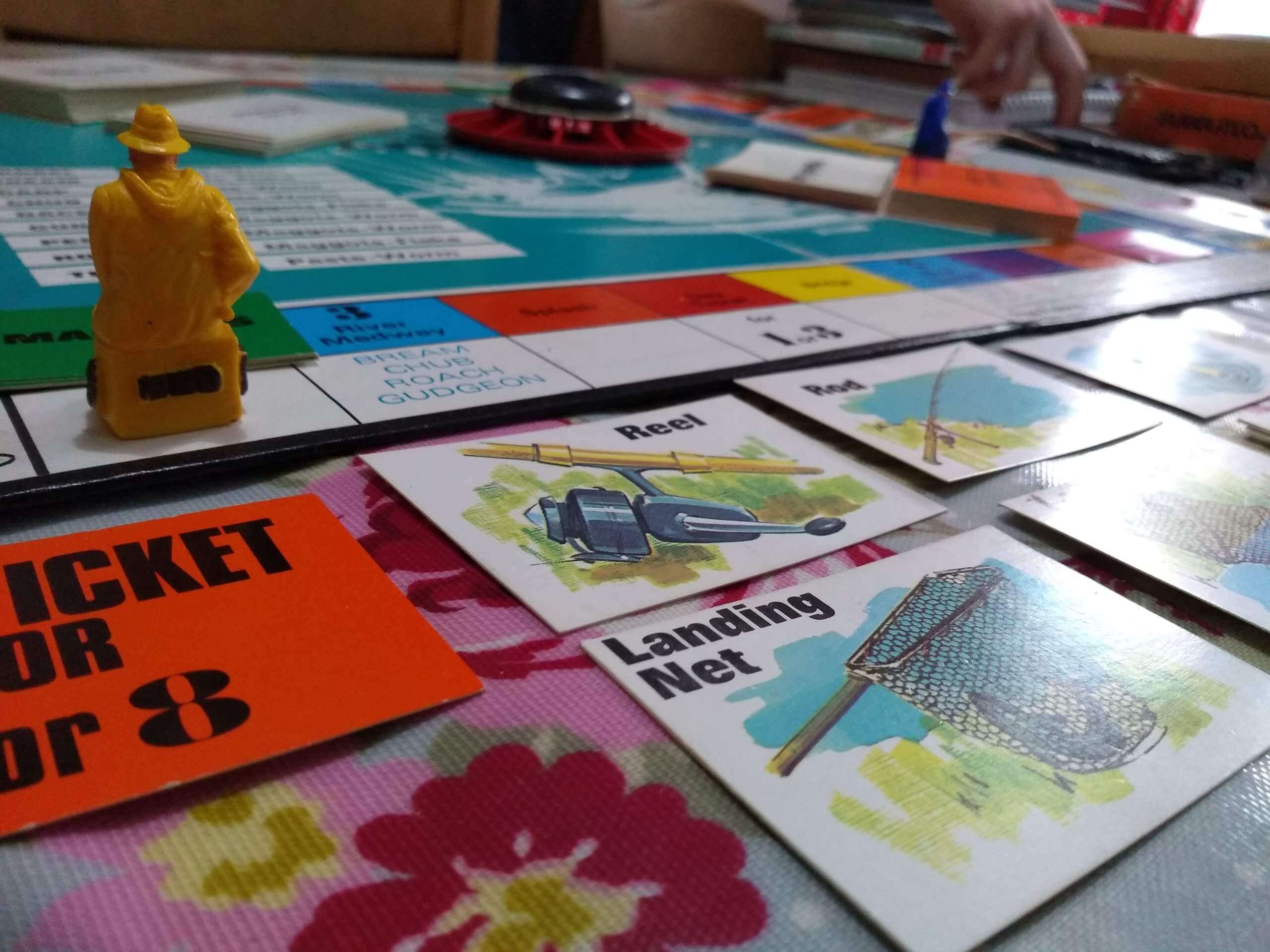
It’s not one that will hit the table regularly but me and Edward had a brilliant laugh playing this and I’m really glad I finally freed it from its box.
It is available to play at any of my events – -just get in touch to request it.
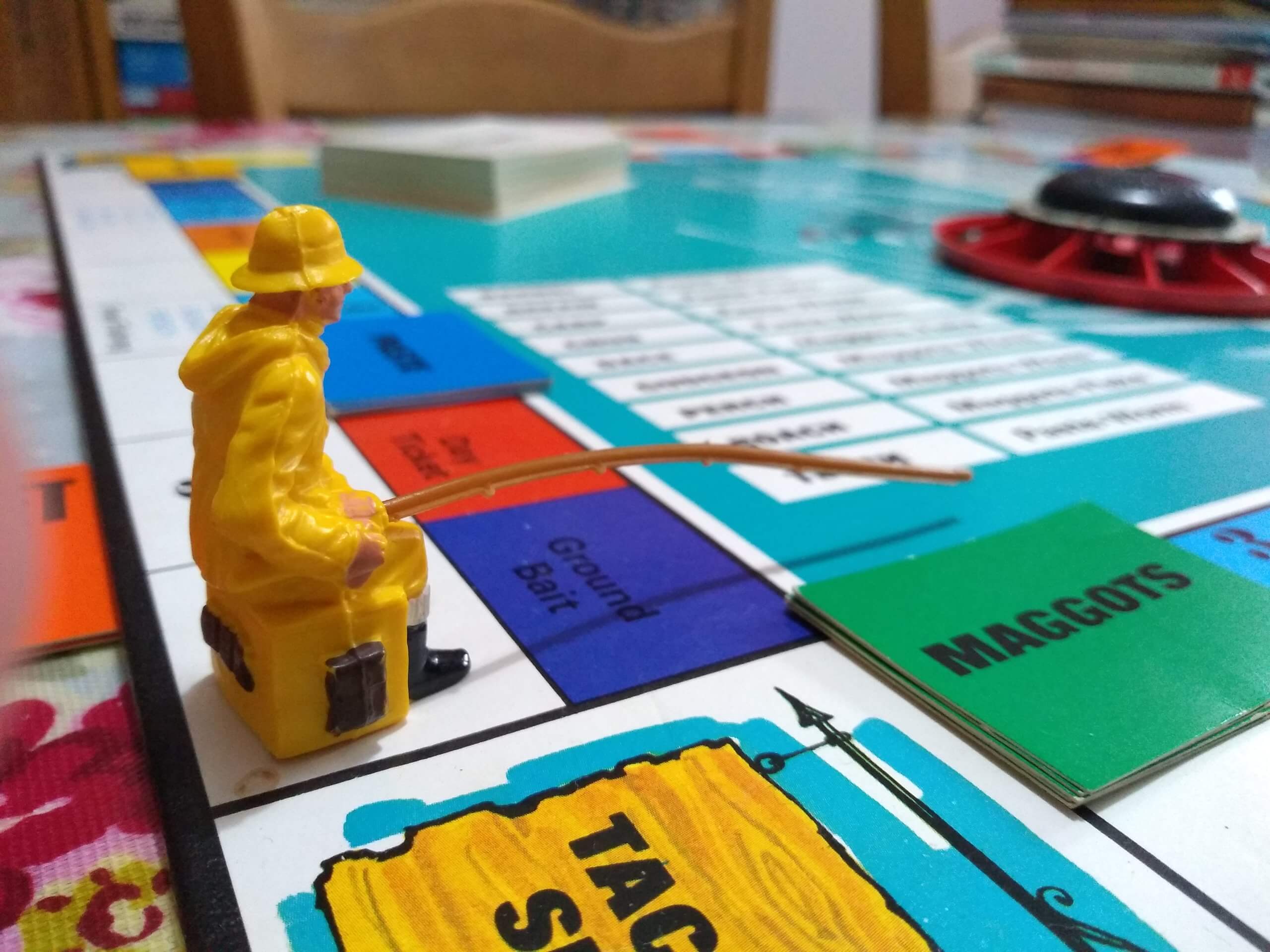
Come As You Really Are
As part of Artangel’s ‘Come as you really are’ exhibition I’m delighted to be collaborating with Barnsley Civic, to display 155 vintage games from the 1940s up to the 1990s – fairly horrified to have included the 90s but here we are! The exhibition opens on the 24th May and runs until 8th August 2025. It is part of a UK wide project led by Hetain Patel and Artangel working with 13 partner organisations including Barnsley Civic. In addition to Patel’s artworks such as Somerset Road (2024), a Ford Escort rugtufted in the pattern of the artist’s grandmother’s living room carpet, and Fiesta Transformer (2013); the exhibition will also showcase a wide variety of local people’s hobbies, things they have made, crafted, collected, modified – presenting an alternative portrait of the UK.
Please just stop it.
It is not without a sense of irony that my first pet peeve is those clickbaity negative posts. I really don’t get why in a hobby where there are small independent companies creating wonderful games…
Why do I take the boardgames to weddings?
Because I’ve been to weddings. I’ve hung around for hours in the daytime, trying not to drink too much, speculating on when the photographs will be done and, most importantly when the food will arrive? I’ve debated the wisdom of a nap between day do and evening do and mostly decided it’s not a good idea. I’ve regretted my shoe choice and had to abandon the dance floor in favour of chatting to people while worrying that I’ve forgotten crucial things they told me 6 hours ago. We’ve spent so long together that we’ve moved on to the stage of friendship where I have to check if I’ve already told them ‘this story’. And, of course because I’m a massive boardgame nerd!

Why boardgames?
The driving force of my business is to bring people together with boardgames. I want to connect people in real life using tactile and engaging games. There are two main things I wanted to offer – a break from our screens and an activity that you can attend comfortably on your own. But after I’d only been in business a short time, I realised how perfect they were for weddings.
For many of us boardgames are a direct link to our past – how lovely to reminisce with friends and relatives about games we used to play together. At weddings we often take time to reminisce – thinking back to when the couple met, how long we’ve known them and for families that can go back to childhood and the games they played together.
There is such an array of games available nowadays. I have games that take less than 5 minutes to teach, less than 5 minutes to play – games where you build or knock down, games where you strategise or just grab objects quickly, ones where you lie, ones where you guess what other people will say, competitive games, co-operative games where you work together to defeat the game. There really is something for every age, interest and mood.
There’s nothing like gales of laughter or the sight of elephants walking the plank to inspire conversation. At any of my events people will go over to other tables and ask what they are playing. It’s a simple way to spark conversation. As a recently diagnosed autistic person I’m realising that I’m better at this sort of chat than I am at small talk. I would far rather hear about what has made you laugh than how far you’ve travelled. I’m also aware that games reduce other social constricts too – no one expects eye contact when you are looking at a hand of cards or a board or both.
Sometimes it’s difficult to remember the details of weddings – we might remember the couple’s outfits or the band or the venue. But mostly in a general sense, we remember if we enjoyed it. I still remember a get together a few years back where we played Herd Mentality – a game where you are trying to give the same answer as everyone else. The question was ‘what is your favourite sandwich?’. I don’t need to tell you that it is not really about what your favourite is, but rather what you think most people will write down. One of our friends wrote down ‘Beetroot and Banana’. In the ensuing conversation she steadfastly maintained that, that is, in fact her favourite sandwich. My memory of us all howling laughing transports me to that room, sitting at that table, the things people said, people’s faces. It is all crystal clear and it still makes me smile. Boardgames are such good fun and still an unusual thing to have at a wedding – they really do create a memorable time.

Aren’t boardgames just for children?
Yes, boardgames are for children but not just for children. In my collection – most of the games (including ones ‘for’ children) are brilliant to play as an adult. Yes, some of them are silly but who decided that being a grown up meant we couldn’t have fun anymore. And games for children still need adult input anyway. For me the best games are where the whole family – all ages – can play and have fun together; where different generations can connect and use their different skills and knowledge together.

How does it work?
All you need to do is book in for a chat either on the phone or video call. You can also drop in to any of my public events to see how it all works. I’ll check if I’m available on the date. Then we can chat about what kinds of games you enjoy and what games your guests might enjoy. I have a massive spreadsheet with all my games on – you are welcome to choose each game you want me to bring or I can choose for you based on what we chat about. Or, somewhere in between – you choose some and I’ll top it up. We can also have a chat about the venue and the room I’ll be in. Then, that’s it! We book you in.
I’ll liaise with the venue about where I’ll be setting up, where I should unload and all that boring stuff that you don’t need to know. Then on the day I’ll rock up with a preposterous amount of games, set them out so people can easily see and access them. People can help themselves but I’m there to teach and recommend them to your guests and get them playing. Easy. Get in touch if you’d like to have a chat.
Teacher skills beyond the long hard stare.

Photo by Liam Booth
As a teacher of 17 years I amassed an array of skills which I fully expected to be reasonably useless in my new business. In my eighth year as Cards or Die I’m realising how many of those skills have supported me in creating fun and inclusive events. So here are my teacher skills that make my events awesome!
Eyes in the back of my head.
It’s a cliche but as a teacher it’s one of the first survival skills that you develop. You can sense rather than see the missile that’s about to be launched and intervene in ways that seem almost psychic. Nowadays I’m not so worried about missiles. But the ability to immediately spot the moment that someone goes off task means that I have an uncanny knack of showing up at your table as soon as you get stuck! It’s like I’m finely tuned into the sound of you debating a rule and the rustling of the rule book pages. Often someone is just leafing through the rule book when I pop up and ask what they’re stuck on – I haven’t escaped the teacher vocabulary! Occasionally I’m just another pair of eyes on the rule book but usually I can answer your question and get you back into the game straightaway.
Teaching Shakespeare to Year 9 on a windy afternoon in Barnsley.
I know when I’ve lost you, even before your eyes glaze over. If you’ve ever encountered school kids on a windy day you’ll know they go a bit feral. Hearing, then seeing your class arrive as though they’ve been shot out of a cannon is one of my least favourite things. However my most favourite thing used to be the time 10 minutes after that when they were enjoying Shakespeare, really getting stuck in to a bit of Macbeth. To do that I’ve learnt to adapt my teaching to meet different learning styles in a group.
The difference is, there used to be 32 people to engage and now there’s only 4 or 5 at a time. It means that when I teach games I’m watching people too and gauging their attention and reactions. I sometimes give a whole overview of the game and other times just get you playing immediately – although the latter approach demands a lot of trust. Often some of the group want to just get stuck in but one or two people will be cautious, unwilling to do something ‘wrong’. I balance this by including the reset option – we play a round with you just playing any card or moving to any space and then we score and if one person is way behind the other, we start again – but – hopefully this time you know what you’re doing! In this first go I always allow take backs – if you didn’t know what you were doing why would I force you to stick to that decision. We can reset anyway. Then there’s the stage between those two. I tell you a bit, you play a bit – I reappear at some point and add some rules in. Or, come back when you need to score it. Personally I like just enough detail so I can start playing. I learn games best through doing. I’d be interested to hear how you learn new games best.
It’s also about flexibility. Being flexible does not come naturally to me. If I have made a plan, I want to stick to it. Having said that, I have binned meticulously and painstakingly prepared lessons part way through because 32 kids looked like their souls were dying. I’m never going to make you play something that you’re not having fun with. If it’s not fun – ditch it! It doesn’t matter how long we spent setting it up, if we’re having a terrible time it needs to go back in its box.
Books for the reluctant reader.
When I was a teacher my response to the claim that anyone didn’t like reading was ‘you just haven’t found the right book yet.’ I had to become skilled at recommending the right book for the individual and the class. Of course at my events I come across less people who don’t want to be there so I’m starting at a much easier entry point! I’ve never once resorted to ‘It’s the law. If you don’t want to do it you’ll need to write to the government and complain.’ Not yet, at least. Just as I got to know lots of books – now I know loads of games so I can ask you a few questions and match you to something just for you.
More commonly it’s that people don’t know where to start with a game – it’s ok, I do. The choice of games can be overwhelming but then that’s what I’m there for – I can teach or recommend games based on what you’ve enjoyed or not enjoyed in the past. When people arrive at events and say ‘we’re knackered’, ‘we’ve had a really long day’. Or, ‘we haven’t seen each other for ages so realistically we’re going to do a lot of chatting’ I’m able to give them a game that suits them.
I bring a frankly ridiculous amount of games along but it’s so that I’ve always got you covered for whatever you are in the mood for. Often the game we want to play depends on mood and headspace. I’m not going to sit and play a two hour strategy game when I’m tired or my brains not fully on. In fact, at that point I want something familiar, easy but satisfying. There’s an irritating trend where game enthusiasts bash other people’s choice of game – it’s too easy, too light, not crunchy enough (whatever that means), it’s an old game, there’s too much luck… the list goes on. As far as I’m concerned all of that can get in the bin. If teaching, teaches you anything it’s that you really can’t keep everybody happy and I’m not going to stand for anyone yucking anyone else’s yum. It smacks too much of cliquey playground bullying for my liking.
Bonus Autism Skills!
I can’t write a blog post that shouts about my own strengths without pausing to applaud the hitherto unacknowledged role my autism has played in the business. I only got diagnosed last year to the complete surprise of no one at all. Now when people ask me ‘How do you remember all these rules?’ I just say ‘I’m autistic’.
One of my favourite skills (which hopefully some of you have experienced) is you ask me for a game in the vaguest possible way – e.g ‘we played it three months ago at Archive. It’s a card game. With animals … or maybe plants…’ and I accurately identify it. I’ve attached a screen shot of a particular favourite. It was a card game called ‘…and then we died.’ There was no bag! I always love it when people request games for events – it helps me to pack. Plus, it often gives me an opportunity to play ‘guess the game’ which is always fun!

Text reads: Hello, I have a random question for you! We once played a game with you years ago and we can’t remember what it was. It was for a really big group of people and there were words in a bag that you had to put together and it made some kind of story. Do you have any idea what it is? We’d love to play it again.
Doctor Seuss once said ‘It’s fun to have fun but you have to know how’. Many people hate organised fun but in reality some organisation helps the fun along. I have a spreadsheet with all my different games on to help you choose games for your event. I say that as though that was the sole purpose all along – actually I just wanted a detailed record myself. I might not be able to tell you where I’m going to be on any specific date (I’m sure you’ve experienced me looking on my own website to answer your dates questions!) but I can tell you all about my games – what it’s like, why you might enjoy it, how you play it, what it’s similar to, where I got it, why I got it …
All this to say that when you book Cards or Die really what you are booking is me. Me – an ex-teacher, grammar nerd who decided to learn all about boardgames. To quote Lydia Deetz ‘I myself am strange and unusual’ and if I’m the right amount of strange and unusual for you – let’s work together! I know that pressing publish on this blog will be harder than many of my previous ones because I’ve talked about myself in glowing terms – something I don’t do.
Finally, if you do have that one person who’s cheating or bending the rules the long hard stare is available. You know, as an option.

